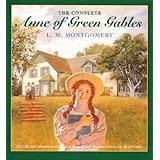“Help us be ever faithful gardeners of the spirit, who know
that without darkness nothing comes to birth, and without light nothing
flowers.”
—May Sarton
 The Anne of Green Gables
series (L.M. Montgomery). Hands down my favorite childhood books. I didn’t just enjoy the stories: I
loved Anne and aspired to be like her. She was smart, spirited, loving and she
always tried to do right and help others. A girl could do worse than emulate
Anne Shirley. Even now, every couple of years, I reread the series for the pleasure of
renewing my acquaintance.
The Anne of Green Gables
series (L.M. Montgomery). Hands down my favorite childhood books. I didn’t just enjoy the stories: I
loved Anne and aspired to be like her. She was smart, spirited, loving and she
always tried to do right and help others. A girl could do worse than emulate
Anne Shirley. Even now, every couple of years, I reread the series for the pleasure of
renewing my acquaintance. The Poisonwood Bible
(Barbara Kingsolver). Another revelation. This was my first experience reading Kingsolver, and I was
forever hooked. Up until I read Poisonwood,
other than the occasional “classic,” I rarely read anything more taxing than an
Agatha Christie mystery. I’ve read nearly everything Kingsolver has written,
and continued to expand my fiction horizons.
The Poisonwood Bible
(Barbara Kingsolver). Another revelation. This was my first experience reading Kingsolver, and I was
forever hooked. Up until I read Poisonwood,
other than the occasional “classic,” I rarely read anything more taxing than an
Agatha Christie mystery. I’ve read nearly everything Kingsolver has written,
and continued to expand my fiction horizons. |
| Photo courtesy Rodrigo Valladares |

Yesterday I started my day with a workout, then cleaned our
master bath and went grocery shopping. It sounds like an average Thursday—and
it was, except for the fact that it was our 25th wedding anniversary.
 |
| So, so young... |

